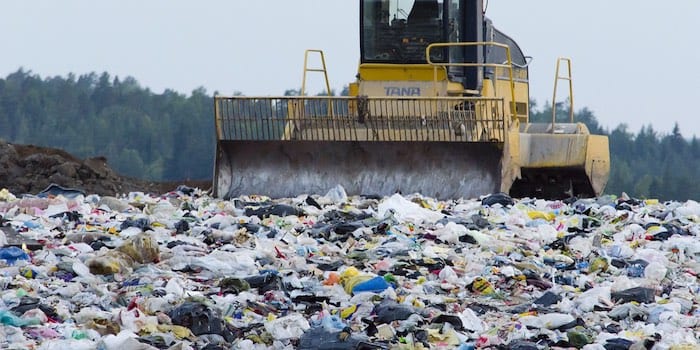
Find out how long it takes trash items to decompose.
With how quickly our landfills are overfilling in the United States, we are having to create new landfills every year that cost around $10 million dollars each.
For many larger cities there are no great options for getting rid of garbage. Landfills have become massive mountains of old furniture, appliances and other types of used junk that will one day be monuments to society’s throw away mentality for generations.
While society is improving slowly and developing biodegradable alternatives to things like plastic, styrofoam and even diapers, the decomposition timelines are still something we should note. But what’s the difference between decomposition and biodegradation?
Decomposition is defined as the biological process where a material degrades itself into compost (organic material that can be fertilizer). Biodegradation is the decomposition of material through microorganisms, aka gets eaten up by worms and smaller living things.
You can help sustain the earth by learning how long it takes common types of garbage to decompose or degrade below, and then adjust your consumption accordingly.
How Long It Takes For Things to Decompose in Landfills:
**Click to auto scroll by section

How long does it take landfill waste to decompose?
It is sobering to realize just how long it takes for what we buy on a daily basis to break down. Let’s find out how long it takes for the major waste categories to decompose.
Wooden Furniture
Yes, wood is natural and biodegradable, but in landfill conditions, it takes longer to decompose. For a standard wooden chair, it takes 13 years to decompose in a landfill.
When you paint wood, it increases the decomposition time even further, and chemicals in the paint can cause additional harm to the environment. Proper disposal of wood can also be beneficial to your bottom line, as it is typically much more costly to send wood products to landfills rather than processing facilities.
Mattress Waste
Some take as long as 80 to 120 years to decompose and they usually float on top of dumps because of their flexible construction. Find out what really happens to an old mattress when you choose to book a junk removal company.
More From the Trash Talk Blog 🧑💻: The Benefits of Eco-Friendly Junk Removal
Plastic Waste
Plastic, in particular, has become one of the most common trash items being thrown away or recycled since plastic is part of almost everything that we buy. Every year we use about 1.6 million barrels of oil just for producing plastic water bottles and they can take more than 450 years to decompose. In a landfill, plastic can take up to 1,000 years to decompose.
Just think, the plastic bags you get from the grocery store are only in use for a couple of hours, but will end up sitting in a landfill for up to a thousand years!
Clothing Waste
In the past 20 years “fast fashion” has become ubiquitous for the majority of people. Everyone wants to stay on-trend, so buying clothes every season is necessary to stay in-style. When you throw out old clothes, just know that these are going to end up in the landfill and will take a long time to decompose.
Wool clothing can take up to 5 years to break down. Nylon fabrics can take 30-40 years to break down. Leather shoes can take up to 40 years. Rubber-boot soles can take up to 80 years. Even cotton can take up to 3 months. Cotton seems like the best-case scenario for buying new clothing that does not harm the environment quite as much.
Even disposable diapers will take 250-500 years to decompose in a landfill. In the United States alone there are over 18 billion disposable diapers thrown away every year.
More From the Trash Talk Blog 🧑💻: What to do with old baby items!
Aluminum Can Waste
Every minute there are more than 120,000 aluminum cans being recycled in America and each one will take 80-200 years to completely decompose in a landfill.
🔋 Did you know? Even aluminum batteries take over 100 years to completely decompose.
Glass Waste
Did you know that glass was made from sand? Probably so, because who hasn’t seen Sweet Home Alabama, right! Because of this, it is rather easy to recycle glass and reuse it by breaking it down, melting it and producing something new. But unfortunately, that does not happen most of the time. When glass is throw in landfills, it takes millions of years to decompose. And according to some, it doesn’t decompose at all.
Paper Waste
Thankfully with paper, it only takes 2 – 6 weeks to completely decompose in a landfill. But, based on volume, paper is the largest element in American landfills, taking up a lot of space and energy. If we recycle paper items, we can easily save a lot of landfill space.
Electronic Waste
E-waste is on the landfill blacklist for a good reason. Electronic devices were made to resist decomposition, forever. The glass they might contain takes 1-2 million years to decompose. A popular statistic floating around is that e-waste accounts for 2 percent of America’s trash in landfills and 70 percent of our overall toxic waste. When you need to get rid of old electronics, be responsible by donating and recycling your old items.
More From the Trash Talk Blog 🧑💻: How to make money recycling!
Miscellaneous Waste
There is a lot of misleading information out there about how long it takes waste to decompose so the majority of these numbers are the average of the amounts we have found.
- Plywood: 1-3 years
- Cardboard: 2 months
- Painted board: 13 years
- Canvas products: 1 year
- Styrofoam: Does not biodegrade
- Lumber: 10-15 years
- Cigarette Butts: 10-12 years
- Sanitary Pads: 500-800 years
- Tinfoil: Does not biodegrade
- Monofilament Fishing Line: 600 years
💡Find better ways to dispose of furniture, appliances and mattresses with helpful disposal guides.

10 Ways You Can Reduce Your Environmental Impact
The ever-increasing volume of waste is a major global concern for all of mankind. Thankfully there are many efforts being made in the areas of innovation, reuse and reduction in order to stem this problem before it becomes an irreversible nightmare.
The best way to do your part to deal with this problem is to avoid at all costs the products that generate waste materials that take more than a year to decompose in landfills, through a proactive design for recycling.
- Take reusable bags to the grocery store.
- Avoid Styrofoam at all costs!!
- Switch to reusable batteries.
- Read the newspaper online.
- Use sweaters for packing.
- Donate all used clothing to local charities.
- Use old clothes and towels as rags for cleaning up spills.
- Recycle or donate your old aluminum cans and glass bottles.
- Buy less food than you need so that you do not let food waste.
- COMPOST. COMPOST. COMPOST.
There are many small changes you can start implementing in your daily routine to make a big difference. Now that you know the decomposition rate for the most commonly used items, you can take the necessary steps to reduce your negative environmental impact.
Considering the rate of decomposition prior to purchase is also one of the best ways to reduce waste. Don’t forget to purchase recycled goods and recycle them after use.
Let’s all do our part!

Related Articles From The Trash Talk Blog

